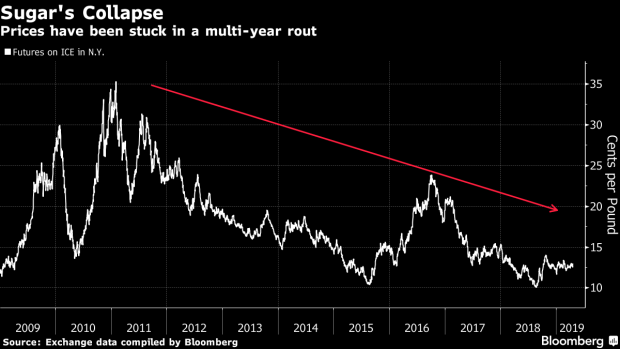Apr 22, 2019
Sugar King Makes Brazil Infrastructure the New Hot Commodity
, Bloomberg News

(Bloomberg) -- The man in charge of Brazilian sugar giant Cosan Ltd. has little interest in talking about the sweetener. These days, he’s all about railways.
The business that gave life to Cosan -- the world’s biggest sugar-cane operation -- has been stuck in the doldrums following years of depressed global prices and government policies that curbed expansion of cane ethanol in Brazil. In stark contrast, the commodity powerhouse is ready to invest “tens of billions” in a plan that will reshape how the nation’s crops get transported, Chief Executive Officer Marcos Lutz said.
“Brazil infrastructure is now the hot story in commodities,” the 49-year-old executive said in an interview at Cosan’s headquarters in Sao Paulo.
The South American nation -- with its vast swaths of arable land along with abundant water resources and ample sunshine -- is already the world’s biggest exporter of agricultural goods from beef to soybeans, and expansion is likely to continue, Lutz said. That means even more pressure on infrastructure and logistics that have seen chronic problems under the weight of the farm boom.
‘Long Winter’
“We see a clear opportunity that derives from a long winter of under-investment,” he said.
Cosan has been at the center of Brazil’s push for investments in train transportation. President Jair Bolsonaro’s government is seeking to double the country’s railway capacity through concessions that will demand about 25 billion reais ($6.3 billion) in capital expenditures over the next few years.
Last month, Cosan-owned Rumo SA won a first auction to complete and operate 955 miles (1,537 kilometers) of railroad that will connect port terminals in the northern and southern regions. The railway is planned to be the eventual spine in a network of lines sprawling across key crop-producing states.
Rumo is also in the final stages of a concession renewal process. The terms include more than doubling the annual capacity of the railway known as Malha Paulista, which connects Brazil’s largest port to the nation’s agricultural heartland. Rumo will spend as much as 15 billion reais in capex through 2023, while “several” other investment opportunities are being considered, Lutz said.
“We’re talking about investments of a magnitude that have never been seen in Brazil’s railway sector,” he said.
The bet has won over investors. Rumo’s market value has jumped fourfold since April 2016 to about $7 billion, the most among global peers. The rail operator is now worth more than Cosan SA, the Sao Paulo-listed company that controls the group’s energy businesses, and its bonds trade above par. Both units are under Cosan Ltd., which is listed in New York.
Cosan owns and operates Raizen SA in a joint venture with Royal Dutch Shell Plc. Raizen is the world’s biggest cane processor and Brazil’s No. 2 fuel distributor. Sugar futures in New York have plunged more than 60 percent from a peak in 2011 amid a global glut.
Rumo fell 0.3 percent to 17.8 reais at 10:15 a.m. in Sao Paulo. Cosan SA dropped 0.5 percent to 46.16 reais.
Lutz isn’t limiting the push into infrastructure to Rumo. Raizen has won the concession of eight out of 12 fuel-port terminals auctioned this year in Brazil as the company seeks to boost its capacity in the nation’s northern region.
Meanwhile, Cosan, which is controlled by 69-year-old Rubens Ometto, will also likely be involved in talks on a planned multi-billion reais sale of refineries by state-run oil giant Petroleo Brasileiro SA sometime this year, Lutz said. While the refining business doesn’t look particularly appealing for the company, potential bidders for the assets might eventually look to Raizen as a long-term fuel buyer.
“As a major fuel distributor, we will be part of this story anyway,” Lutz said. “I don’t know how it will be, if we will be buying a small shareholding, make a long-term supply contract or a different commercial arrangement -- but I will have to take a close look at this.”
(Updates with share prices in 12th paragraph.)
To contact the reporter on this story: Gerson Freitas Jr. in São Paulo at gfreitasjr@bloomberg.net
To contact the editors responsible for this story: James Attwood at jattwood3@bloomberg.net, Patrick McKiernan
©2019 Bloomberg L.P.


